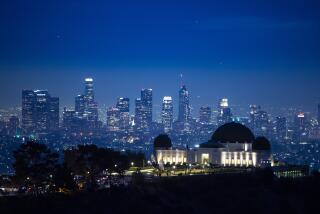Meteor Shower Expected to Dazzle
- Share via
The Leonid meteor shower, described by one astronomer as “the granddaddy of all meteor showers,” will produce a spectacular light show throughout California early Tuesday morning despite a nearly full moon.
Dark, remote locations far from bright city lights, such as the Inland deserts, will provide the best view of the shower. Still, astronomers at NASA’s Jet Propulsion Laboratory in Pasadena said the shower will be so intense that it will be clear in most urban backyards.
“The darker the sky the better,” said Don Yeomans, an astronomer at JPL. “The full moon is going to make the sky brighter anyway. You will get a pretty good view from just about any backyard.”
This year’s meteor shower was first seen early Monday morning over Europe and North Africa. It will peak in California about 2:30 a.m. Tuesday.
The Leonid shower gets its name from the constellation where it appears to originate: Leo the lion, which will rise out of the east-northeast sky. Astronomers recommend that stargazers face east but try not to stare at any particular point.
The Leonids are grains of dust from Comet Tempel-Tuttle colliding with Earth’s atmosphere. Every year in mid-November, Earth crosses the comet’s orbit and the Leonid shower becomes visible.
The comet itself appears every 33 years, and the meteor shower is most intense around those years.
Unlike some previous Leonid showers that generated about 15 meteors per hour, this meteor storm will be so close to Earth that it will produce several hundred meteors per hour, Yeomans said.
“This is the granddaddy of all meteor showers,” he said. “They don’t get much better than this.”
Most Leonids will appear as fleeting streaks of light, but JPL scientists recommend that stargazers watch for bigger ones that generate fireballs and trails -- some of which will remain visible for several minutes or more.
Most particles are tiny and will vaporize very high in the atmosphere due to their extreme speed.
They pose no threat to people on the ground, but experts said there is a slight chance that the meteor shower can damage sensitive electronic components on satellites orbiting the Earth.







